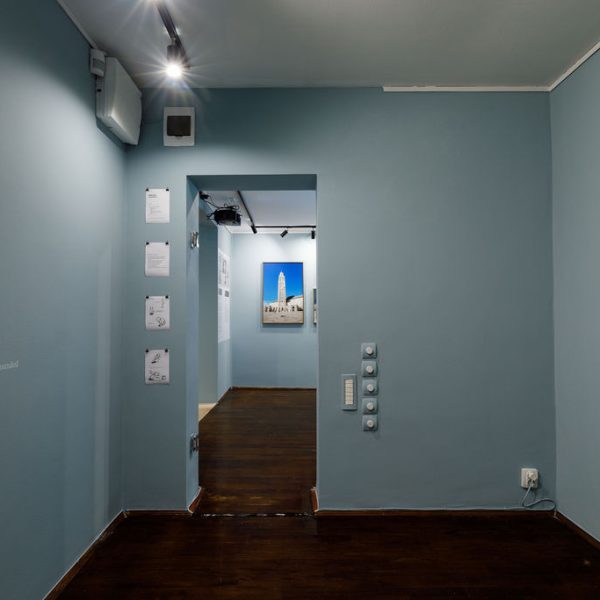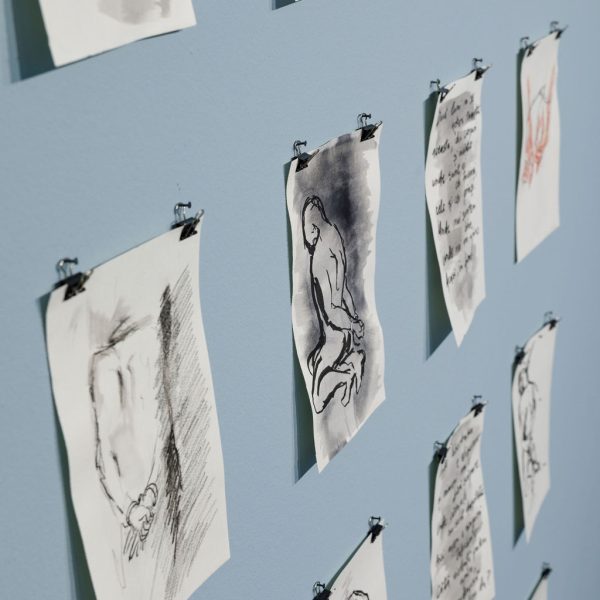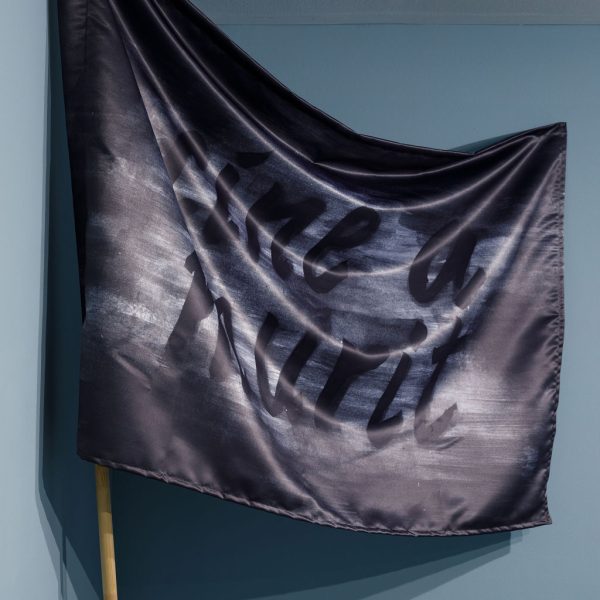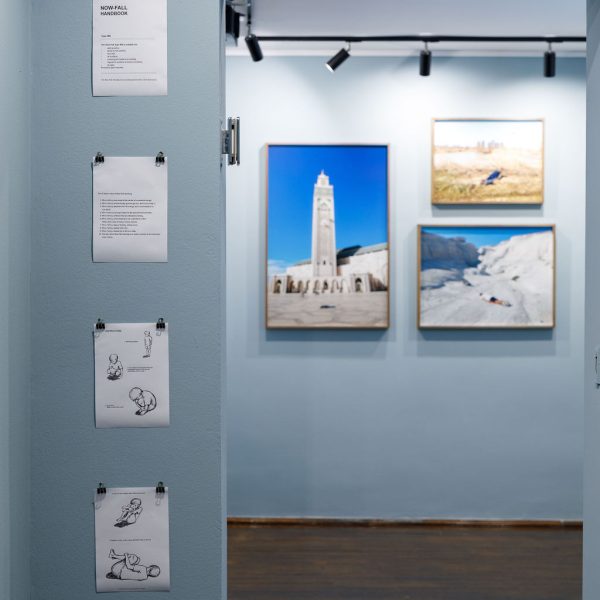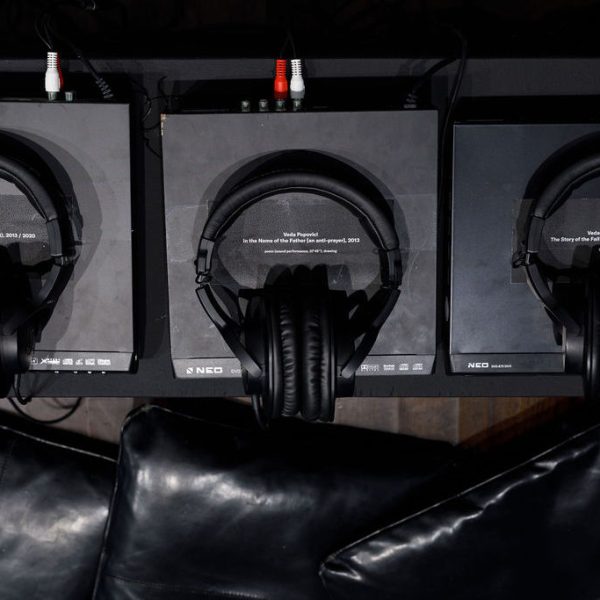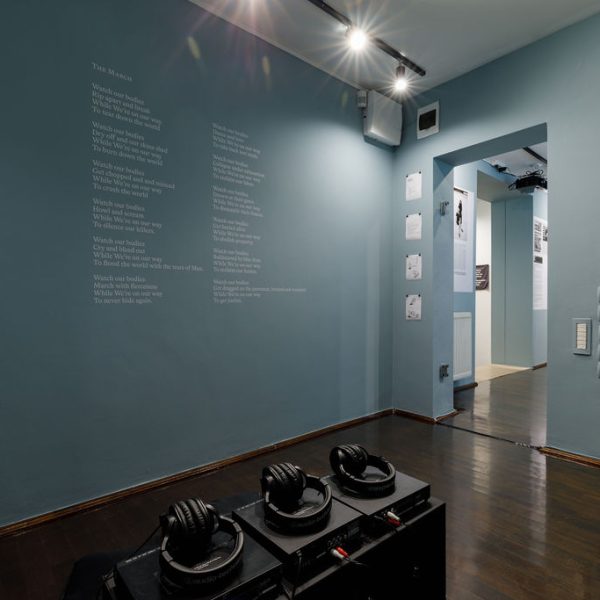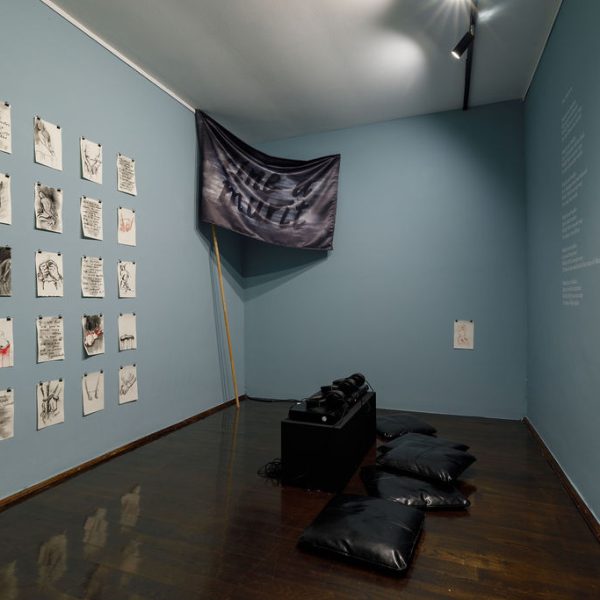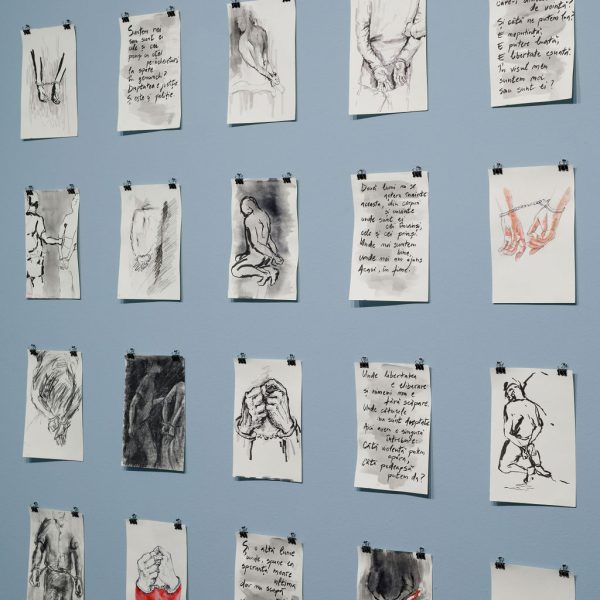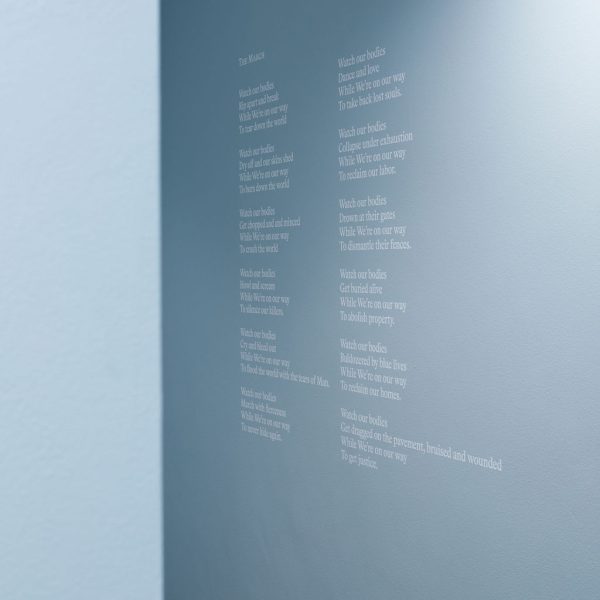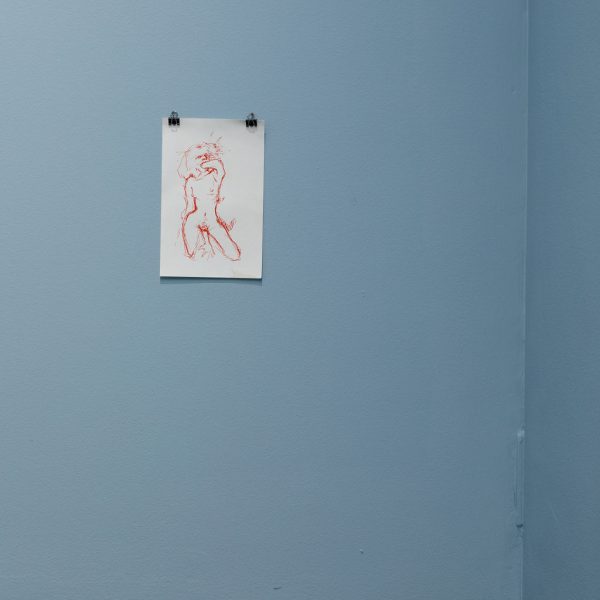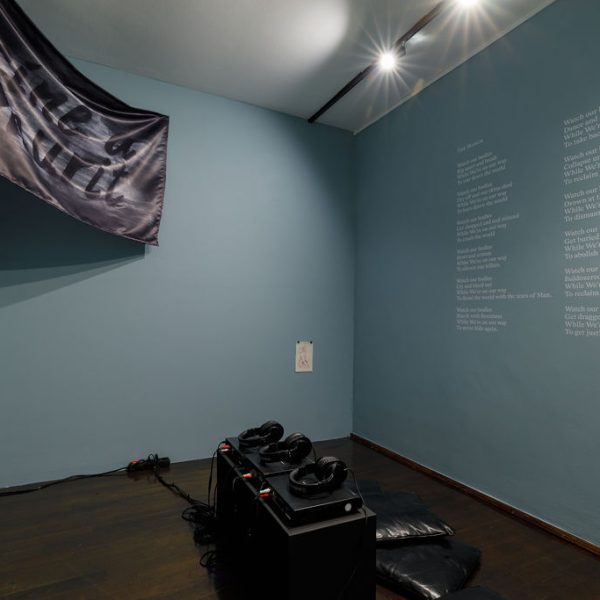Veda Popovici’s first solo show, and the first exhibition included in the TRIUMF AMIRIA – MUSEUM WORKINGS cluster at Zina Gallery in Cluj, TRIUMF AMIRIA LOVE LETTER TO VEDA POPOVICI is a cross-sectional outlook on a genuinely hybrid artistic, curatorial, academic and activist practice.
By means of investigating and mobilizing different discursive formats—from poetry to drawing or sound installations—, Veda Popovici’s works are a (self-)reflection on the mechanisms of contestation and therewith a plea regarding the performative character of any endeavor caught between divided realities. All works draw on and negotiate with the inevitably dynamic and dual character of this type of approach: as channels for the thematization of/ as manifestations of a political necessity through art, they take shape on the spectrum between the possibility of victory and defeat, between analyzing the state of affairs and the desire / proposal for change.
The firm anti-authoritarian commitment of the artist works as an echo of a continuous questioning process, directed not only towards the outer world, but also inwards. The conflict in navigating the realm born from the potentiality of those two worlds is acutely experienced and becomes the leitmotif of the entire exhibition.
The frame with / in which Veda Popovici performs pertains to feminist, queer and decolonial theories—both at the level of discourse and concerning the search for active forms of expression or developing instruments of artistic language with political subversive and emancipatory potential. The results of those laborious processes involve, almost without exception, a call to action / a proaction. The performative character is always present, with the body taking up the place of point of departure and of instrument of choice for the artist; in the same way, her whole artistic practice relies on a certain way of understanding participation, as being rooted in or as congregator for collectivities (regarding this very subject, of collectivities and camaraderie networks, or the pronoun “WE”, such as it is graphically emphasized in the poem “The March [Watch our bodies]”, it is essential to call to mind Veda Popovici’s involvement in autonomous, anarchist, decolonial and feminist initiatives: from the Bezna collective and Gazeta de Artă Politică, to Dysnomia and her role as co-founder of the Claca center, of the FCDL [The Common Front for Housing Rights], of Macaz cooperative and of the Autonomous Macaz Center).
Two types of works could be therefore identified in the exhibition TRIUMF AMIRIA LOVE LETTER TO VEDA POPOVICI: on the one hand, those immediately inspired by her activist work and collaborative practices, offering a backwards-forwards outlook, like the poem-installations “The March [Watch our bodies]”, and “In the Name of the Father”; on the other hand, the series of drawings and texts revolving around confinement / shackling [“Încătușare”], as well as the installation “Who died?” (a bridge between the two groupings of works) stem from an intimate experience—of solitude, claustration and powerlessness—in the pandemic context, only to develop further on into broad questionings of oppressive systems.
“The Story of the Fall” (2013 / recently republished in the Bezna anthology, in 2020) is conceived as a sound performance returning from an imagined post-apocalyptic future—thus functioning both as counterfactual artefact and mnemotechnical instrument relating to this bidirectional history—in which a concerted effort of abolishing oppressive systems is at work—from the inside. The fall, present both in the sound performance and also graphically, in the drawings and indications from the “Now-Fall Handbook”, represents a sort of vertiginous antidote-training through which the complicity of all participants is exorcised, the fear of abandoning the known world is embraced, thus becoming a passing ritual towards a radical transformation of society. Through the fascinatingly reassuring voice of the artist, an initially terrifying-dystopian scenario becomes affirmative for a new life, suggesting infinite possibilities.
Envisioning speculative histories that produce radical cracks in the layers of reality, and empower generous futures / pasts through progressivist ideas is a strategy often found in other of Veda’s works—consistently, for instance, amidst the series “History Does (Not) Repeat Itself” (2017-2018), made in collaboration with the artist-theoretician Ionuț Cioană / Mircea Nicolae (1980-2020) and to whom the “Now-Fall Handbook” from this exhibition is dedicated.
The Series “Încătușare [Confinement / Shackling]” (2020-2021), the two poem-installations “The March [Watch our bodies]” (2020-2021) and “In the Name of the Father” (2013), alongside the flag “Who Died?” (2021) function as a grouping of works speaking about the necessity of a culture of protest and, equally, about the internal displacements in a realm which is oftentimes leaving room for a feeling of powerlessness. Body politics, reflections on violence and exploitation that define contemporary society, the contrast between contesting bodies and the agents of oppression are all elements that produce a double reading of “confinement”: the perceived one, the burden of a constraining present that needs to be confronted, and the anticipated one, whose subjects are those oppressive agents, “the others”. The nodal point is defined by questionings on the nature of a necessary justice (see also the artist’s writings on the themes of anti-police and anti-punishment practices, as well as those with abolitionist potential regarding the penitentiary system) and on how an inversion of the power dynamics could be achieved—avoiding, however, the reproduction of the very mechanisms already at work. Following the logic of those antipodal forces, mourning eventually enters the stage, an element approached both with (dark) humor and in depth, in the work “Who Died?”. The anarchist aesthetics of protest—whose mise en scene features the black flag—has prompted this question (“who died?”) from unassuming passersby, a clash that for the artist (especially in the present context) is indicative of many layers of significance: from the symbolism of the anarchist flag and a discourse inevitably focused on endings, to the detection and anticipation of (possible) disappearances amidst which grief and the act of mourning can become catalyzing forces.
Seen as political action, Veda Popovici’s works transit the world with autonomous effects: once the need for radical transformation is materialized in a gesture, the transition towards a fundamentally unpredictable—and therefore uncontrollable—space of plurality takes place. Admitting and embodying in their very structure this “failure”, moreover twisting it through the perspectives of artistic discourse, the works can be seen as possible examples of metabolizing, processing and transposing concerns situated at the crossing between opposing “worlds” into different visual and speech formats. Consequently, the works do not put forward solutions but rather guide us—sometimes as a handbook, sometimes as logbook—through the conceptual universe assembled by the artist, and along the way(s) in which she navigates it; and the intimate outlook on this negotiation is complemented (in relation to the viewer / spectator) by an always present—visible—invitation to reflection and, further on, through a (possible) call to (re)positioning.
Veda Popovici is a political worker, theorist and artist dedicated to anti-capitalist, anti-authoritarian and communitarian principles and practices. Her work navigates these fields of action focusing on material possibilities of reclaiming the commons and decolonial, queer and feminist practices.
Her art practice is based on situational interventions, performative, collective and object-based productions while exploring the possibilities of political imagination and the body’s ability to influence it.
One of her recent projects, co-created in 2017-2018 together with Mircea Nicolae, is History Does (Not) Repeat Itself, a speculative history of 90s emancipatory people’s struggles in Romania. Her political work has developed in the context of various autonomous, anarchist and feminist initiatives such as the Bezna collective, the Gazette of Political Art, Dysnomia community, Claca center, Macaz cooperative and autonomous collective. After finishing her PhD on nationalism in Romanian art of the 1980s, she has taught classes on decolonial thought, nationalism and feminist theory at the National University of Arts in Bucharest and at the University of California Santa Cruz. Dedicated to radical housing organizing, she has cofounded in 2013 the Common Front for Housing Rights in Bucharest.
Since 2016 she is a co-organizer of actions for the national federation for housing justice The Block for Housing and since 2019 she is the facilitator of the European Action Coalition for the Right to Housing and the City. She is based in Bucharest.
Photos – YAP Studio: Pavel Curagău and Mădălin Mărgăritescu

